In collaboration with his NYU Abu Dhabi seminar students
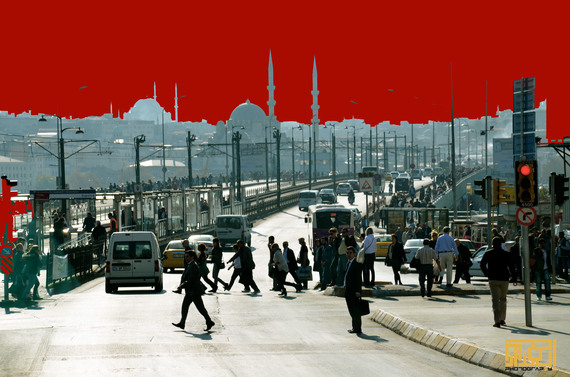
And then the Erdogan’s AKP government suddenly faced a popular uprising, not just from the other others, the separatist ethnic Kurds, the Shiite Alevis, but from their own, the “real” Turks. In June 2013, in a scraggly pocket park at the center of European Istanbul, the republican-religious fault-line exploded in Erdogan’s face. University students, soccer fans, feminists, LGBT activists and white collar corporate workers who came to protest in tennis shoes and ties, Turkish nationalists who chanted that they were children of Ataturk, members of the minority Shi’ite Alevi community whose religious institutions are still not recognized by the state, and even a significant number of pious Sunni Muslims who think social justice and democracy are part of the Islamic project faced off for weeks against police attacks. The police used so much high toxicity tear gas sprayed at anything that moved that the national government ran out and had to order a new massive stockpile. The protests spread to almost every province of the country.
Erdogan may have closed the continental divide with his deep tunnel under the Bosporus, but the cultural divide between secular and religious national identity, between those who understand Islam as a way of life to be supported by the Turkish state and those who see it just as a cultural identity and ethical compass that should have no place in public life, has burst into the open. This division is now at its widest and deepest since Erdogan was first voted in to office in 2002.
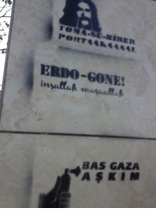
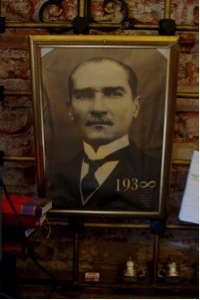
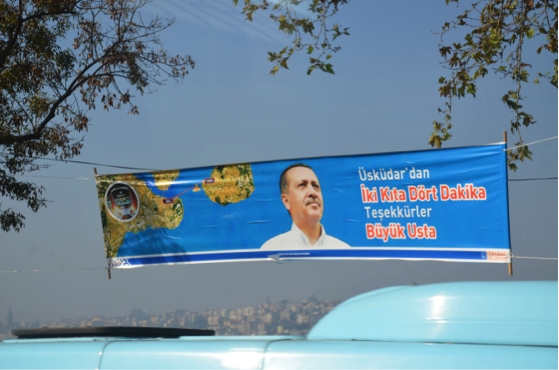
Erdogan succeeded. Pious Muslims could now be “the hosts,” and not just the “guests” in Turkey’s secular public sphere, explained Semiha Topal, a young professor at the Fatih University, an Islamic institution in Istanbul’s far suburbs. When she spoke to us Topal had only been able legally to wear her headscarf to teach her classes for the last two weeks. Before public officials could not wear them to work. In the same week as the underwater rail linked Europe and Asia, four female deputies came to parliament wearing headscarves for the first time in the history of the Republic.
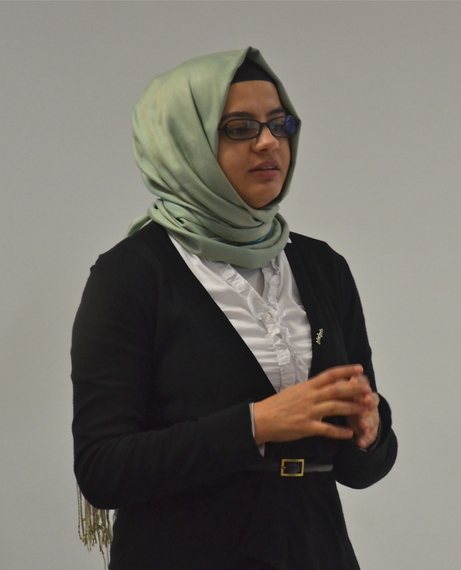
The Prime Minister’s accomplishments are remarkable. During eleven years of rule Erdogan’s regime sustained robust economic growth in which an Anatolian Muslim bourgeoisie outperformed the state-protected secular capitalist class and now controls the commanding heights of the Turkish economy. It was those businessmen who wanted into Europe, the price for which was an economically and politically liberal state. Erdogan used that opening to establish political control of a military that had repeatedly crushed religious parties they understood as threats to Turkey’s secular republicanism. He mediated a political process in which the Kurds –millions of whom have been displaced in their guerilla struggle for cultural survival, unable to broadcast or teach their language, forbidden even to use the letters q, w or x which do not exist in the Turkish alphabet, agreed to lay down their arms and negotiate towards an autonomy.
But for many today all this is not enough to justify his authoritarianism, his restrictions on the freedom of the press, the environmental and social costs of his unbridled embrace of the market and, most centrally, his religiously inspired effort to control Turkish private life. What began as an environmentalist defense of one of the last bits of Istanbul’s common green quickly morphed into an all-out war for the defense of the republican center of Istanbul, rallying around Taksim against Erdogan’s increasing use of state authority to impose a religious agenda on their private lives, his commitment, as he proudly announced, to raise a “religious generation.”
The secular republicans have always had an uneasy relationship with Istanbul, the historic center of the Islamic Ottoman empire. They had built up Taksim Square, to which the tiny Gezi park is adjacent, as Ataturk’s space, the secular center. Built in the European quarter of the city, far from the city’s Islamic Ottoman zone, the square was mosqueless and meant to be modern, hence European in style, with its Ataturk Cultural Center housing the city’s only opera house, and once the place where the city’s football matches were staged. It was here in its central plaza that Kemalists who had constructed modern Turkey against Islam would mass. It was, and still is, the place where the left and the labor unions hold their rallies.
Erdogan has long wanted to re-take and re-brand Istanbul as the emblem of his Islamist regime, to assert the historical continuity between the Ottoman empire and the Turkish state. He became the first Prime Minister since Ataturk to locate his office in the Dolmabahçe, the last and largest Ottoman palace, a massive European, neo-classical structure built in the 19th century for the Muslim sultan with literally tons of gold and silver slathering its surfaces, the largest chandelier in Europe and crystal balustrades in its staircases. The exorbitance of this palace had helped sparked the revolution that brought down the Ottoman empire.
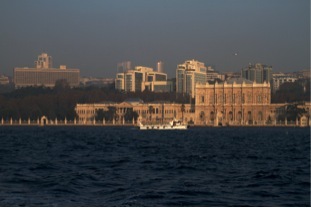
It is not then surprising that in the center of Istanbul itself, in this secular zone which the Ottomans had set aside as a place for the European infidels, that the Prime Minister would want to plant an Islamic presence. As Istanbul’s mayor Erdogan had sought – and failed — to build a major mosque at Taksim; as Prime Minister he has continued to push for it. The Gezi Park redevelopment was part of Erdogan’s plan to rebuild a monumental Ottoman barracks in the style of the one attacked in a 1908 Islamist uprising against constitutionalism, in which it had been predominantly Christian officers who had been slaughtered. The barracks was to be combined with a shopping mall. This nexus of neoliberal caliph and crony capitalism was the perfect symbol of Erdogan’s regime against which many of the protesters raged.
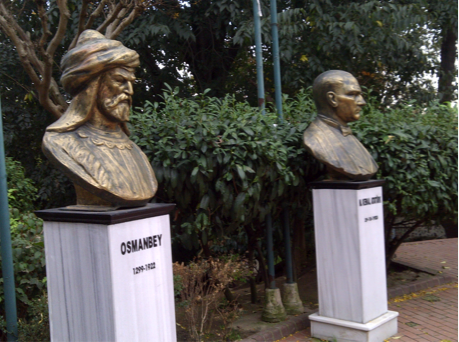
These days all’s quiet on the Western front. The protests that began at Gezi against the building boom that gobbled up the forests and ruined the city’s skyline, covering the metropolis with a smoggy gauze, against the police repression, against the increasingly authoritarian style of Prime Minister Erdogan’s regime and his tight marriage to firms and business groups who get the contracts to build if they toe the line, have stopped. So have the extraordinary town meetings that occurred not only in Istanbul, but in smaller cities and towns, in which people from groups normally at odds civilly argued about a new political future.
The Prime Minister did everything he could do end these dialogues between the rival camps. In a way they were much more threatening than the protests, which became ugly street battles as the night wore on. Rather than seek to bind the religious and the secular, Erdogan has angrily, even vindictively, sought to push them farther apart. Doctors who treated the wounded would be subject to arrest. Newspapers and television stations that covered the protestors’ side of the story were sanctioned, reporters let go, forced into retirement and even arrested. CNN Turkey was so frightened it ran a documentary on penguins the night the city exploded, such that the penguin has become a ubiquitous symbol of opposition. A Muslim cleric who had given protesters shelter in his mosque lost his job. Even the Gulen, a neo-Nursi network of Islamic schools, looked like it would have its lucrative tutoring service closed for failure to come to the defense of the regime.
Adept at Turkey’s paranoid style of politics, Erdogan has railed against enemies inside and out, against the “interest rate lobby,” referring to financial groups that had tacitly or explicitly supported the protests, against the Mossad whom he claimed had fomented the turmoil (and the military coup in Egypt as well), even against Lufthansa which he claimed supported the protests because they wanted to prevent Istanbul from displacing Frankfurt as Europe’s dominant airline hub.
But Erdogan’s most persistent play has been the body card. It is a high-risk gambit based on the state’s moral regulation of private life and the demonization of those who do not conform to his understanding of the requirements of Islam: the modesty of women, the prohibition of young unmarried couples kissing in public, the disapproval of premarital sex, the promotion of childbirth as the ideal state of woman, an effort to ban abortion, caesarean section, and a wholesale attack on alcohol consumption.
The “AK” in AKP, means “pure” or “white” in Turkish. Erdogan not only wants to Islamicize the secular center, he seeks to purify the nation’s public space, to rid it of sin. Alcohol, Professor Topal trenchantly puts it, is the “sacred of the secular people.” The Fatih University professor is right. Ataturk was a raki drinker. Although the protesters declared an alcohol-free day out of respect for a Muslim holiday, there was a defiant drinking at Gezi. No wonder: Erdogan has shut down large numbers of the cafes downtown where you could drink a raki or a beer. He has banned alcohol sponsorship of public events. He has prohibited alcohol sales between ten in the evening and six in the morning. He has forbidden stores from showing booze bottles in their windows. The Prime Minister has created a climate where ordinary officials feel entitled to sanction those who imbibe. A man lugging groceries home on the ferry between the European and Asian sides of the city, I am told, was asked to debark when the boatman espied one of his grocery bags contained bottles of alcohol.
Erdogan’s people not only claimed that the Gezi protesters brought beer cans into the mosques, he claimed they were having sex in there — and everywhere. Television stations allied with his government incessantly played a clip of a young man inside a mosque where he had taken refuge physically comforting a woman who had been gassed, claiming they had engaged in indecent behavior. When Erdogan ordered the police burn the protesters’ tents, he pointed to the immorality of young men and women spending the night together. More recently, he has vowed to investigate university dormitories where young and women live together. “This is against our conservative democratic character.”
By means such as these Erdogan aims to rally the morally upright Turks who are with him against the secular republicans, the “white” Turks who live a Westernized high life. It is a dangerous play. The division not only threatens his rule; it has menacing implications for the future of Turkish democracy. Before Erodgan pious Muslims were made to feel uncomfortable in public for wearing headscarves or for praying. Now it is the seculars who feel like this. “I feel like a minority in my own country,” confesses a highly-placed Turkish woman who says she only feels comfortable dressing as she wants when she leaves the country. When I asked a secular Republican tour-guide at a Turkish museum how she feels about the newly headscarved parliamentarians, she says she is happy to see it: It had been wrong to exclude them. She is hoping, she says loudly enough for the other visitors to hear, that the next thing will be the seating of an openly gay or lesbian representative. A number of Turks wheel around to see who could be saying this. “I voted for him,” she confesses. “He said he would treat us all as equals. He broke his promise.”
Gezi drew as many women as men, explains Barçin Yinanç, an editor at the secular Hurriyet newspaper, because it was an “outcry” against the “heavy-handed style” of Erdogan, who “thinks he is not only the prime minister of this country, he’s the mayor, he’s the lawyer, the judge, and he is even the gynecologist.” She is furious that Erdogan has come out against abortion, against Caesarian section. Indeed, there is no religious basis for opposition to abortion, as Muslims understand “ensoulment,” and hence full humanness, not to occur until a hundred and twenty days after conception. All of Erdogan’s agitation against immodest contact between young women and men, Barçin jibes, is “because he has not flirted; he has married his wife in an arranged marriage.”
Women’s bodies, one of the main drivers that brought Erdogan to power, may ultimately be what helps limit his hegemony. While the AKP earlier mobilized religious women to demand their rights as women to be pious in public, demands that many secular feminists supported, in the aftermath of Gezi Park, it is a real possibility that secular and religious women may again organize around the defense of their common interests, not as identity politics, but as human rights.
The odds are long, but now that the headscarf battle is over, we met a number of secular feminists and religious Muslim supporters of women’s rights who are hoping to move on to issues that will unite, not divide, them. Secular feminists tell us they are glad that the headscarf is done. The litany of victimhood, which was real enough, can end. It is time, they say, to get to work once again as they did when they earlier transformed Turkey’s penal code so that, for example, a woman’s hymen became her, and not her family’s, property, that a rape was still a rape even if the assailant married the young woman.
It is around women’s rights that a bridge might be built. “Yes to women’s rights, but no to feminism,” says Semiha Topal, the Fatih university professor. Feminism, she says, is “a part of an Enlightenment discourse” that “pushed God out of life.” Pious women activists do not support feminism, a politics they understand as based on the sameness of men and women. God created the sexes differently with different primary functions in this world. But that does not mean women should not be able to choose to marry and to divorce their husbands, to be able to get abortions, to be treated equally in the labor market and as citizens, to not be beaten or raped by their husbands. Unlike pre-marital sex or alcohol consumption, violence against women is a pandemic problem in Turkey that they can agree upon. So many women are being murdered by their husbands, mostly because they want a divorce, that Turkish feminists are talking about “femicide.” Women’s labor force participation rates have plunged.
The demand for such rights even brought some pious Muslim women to Gezi park, women like Feyza Akinderdem, a pious, headscarved mother of two, who belongs to a network of three hundred religious women who support women’s rights. Akinderdem won’t call herself a feminist. She, too, insists that Islam is based not on gender equality, but on gender differences. But she says: “Feminism is not something you have to believe like the Quran. You can choose it.”
Feyza summed up her choice to go to Gezi around the following slogan: “Get your hands off from our bodies.” She, like a number of educated Muslim women, came – even though there was drinking and kissing and who knows what else – because she supports a women’s right to control her own body. She came in the teeth of opposition by many in her community who accused her of creating the grounds for a military coup, of condoning the alcohol-drinkers, the immodest women, the kissing and even the sex. Didn’t they understand, she pleaded with them, that this government’s effort to ban abortion was no different from the previous government’s banning of the headscarf? Most didn’t. Feyza, like other educated Muslim women whom we met, want to take the struggle for women’s rights out of the religious domain, to make it about secular rights, not a critique of Islam. It is only this way that pious women like these will be able to both convince the members of their own community and make common cause with secular women.
Erdogan is vulnerable. It had been the pressure of the accession talks that had given Turkish “feminists” so much influence in changing the Turkish penal code. But since then both the French and the Germans have put the boot in to Turkish accession to the EU, which means the pressure for liberality is off. On the other hand, Turkey’s foreign policy is in tatters, with the Saudis, the Iranians, the Syrians, the Egyptians, and of course the Israelis all variously estranged from his regime. Sources who follow Turkey’s business community claim big chunks of the Anatolian capitalist class believe that Erdogan jeopardizes their profitability and even the future of the AKP party. That Erdogan urged Turks to take their money out of Turkish banks in the wake of Gezi made a lot of them worry. Erdogan’s crony capitalism based on huge public works and urban construction is not a viable long-term strategy for growth, some say. Muslim capitalists who support a free market tend to be the base of the Gulen movement, who may be the critical lever that upends Erdogan’s primacy and counters his base of a new state-supported Muslim capitalist class. The Gulen community, the core of Turkey’s Islamic civil society, is in open warfare with the AKP regime with its continued attacks on Zaman, the Gulen-based newspaper conglomerate. The more conciliatory Abdullah Gul, the number two in the party, might challenge Erdogan for the post of President, an office Erdogan wants to make into an American executive which would allow him to hold on to power for a long time to come, not unlike Putin did in Russia.
What happens is anybody’s guess. The future of Turkey hinges on how it handles its “others,” not just the Kurds and the Alevis, but its women and its right to regulate their bodies. In the past religious and secular women were able together to play the European card to transform Turkey’s legal code to expand their rights. But there are likely to be openings again. In this patriarchal state we should not rule out the possibility that Turkey’s women can once again play a critical role in shaping a democratic future.
“I do not believe in happy endings,” Feyza tells us. I believe in struggle for truth and reconciliation, which is absent in Turkey now.”
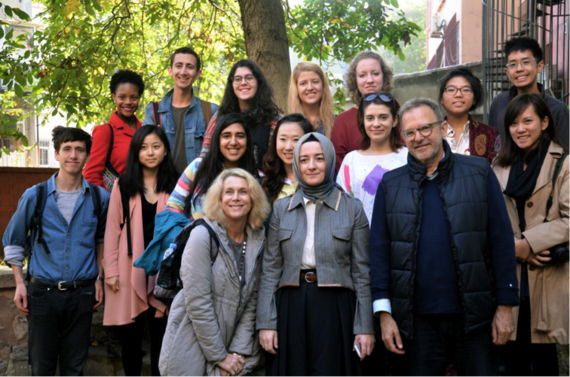
Research Practicum Members: Tessa Ayson, Alistair Blacklock, Roshni Dadlani, Symone Gamle, Darin Gancheva, Imen Haddad, Danyang Kang, Dylan Maurer, Leah Reynolds, Lucia Salem, Sala Shaker, Alexander Wang, Charlotte Wange, So Ra Yang, In Kyung Yoon, Debra Friedland and Humeyra Sahin
Photography: Imen Haddad, Dylan Maurer and Charlotte Wang
https://www.huffpost.com/entry/turkeys-body-politics-can_b_4367715
